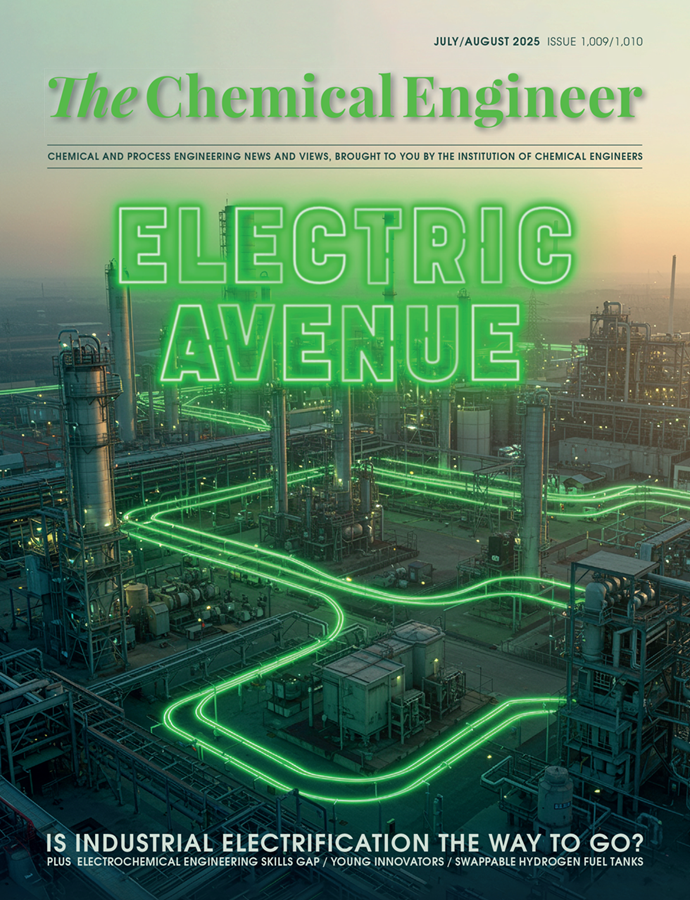IChemE Matters - September 1011

Bridging borders: Reflections on China’s innovation and chemical engineering’s future
Raffaella Ocone, IChemE president
Invited by the World Congress of Chemical Engineering (WCCE) to deliver a plenary at the 12th Congress of Chemical Engineering in China, IChemE president Raffaella Ocone says she was both overwhelmed and energised by her experience
ALTHOUGH I am a regular to China, this occasion was somehow more special, with my keynote speech on “The role of chemical engineering in the energy transition” interlinking my personal research with the work of the Institution.
The invitation to speak came before my presidency but, independently from that, IChemE strategy featured in my presentation – an interesting experience, wearing two hats, managing the balance between technical detail and global vision.
I’m not exaggerating when I say that the experience was overwhelming. The level of innovation in China is astonishing. Its pathway for advancing its innovations through technology readiness levels is well developed, understood and agile, bringing discoveries to market in a faster and more effective way than most of the rest of the world.
As a community, we often speak of the need to innovate faster so what can we observe and learn from China. Well, China is committed to the “dual carbon” goals of reaching peak emissions by 2030 and carbon neutrality by 2060. To this end there is a high adoption of electric cars in Beijing, and high adoption of AI. This is underpinned by strong national support for decarbonising foundational industries and a strategic focus on CCUS, with more than 100 projects either operational or in development across the country.
After the WCCE, I travelled to Shenyang to attend the Chinese conference on Fluidization where I was invited to deliver a keynote – the first European to be invited to such a conference.
I felt like a “real” engineer, interacting with other real engineers that make “things” for society’s good. Importantly, such a vibrancy made me appreciate, as an academic, the fortune to be training the next generation of chemical engineers. China has a high level of respect for teachers and scholars, and it is clear to everyone, from the industrialists to the users that, without developing and nurturing new talents, in a word, without educators, there will not be engineers (no process, no product!).
I also attended a meeting organised by the Chemical Industry and Engineering Society of China (CIESC), bringing together over ten global and regional scientific societies including EFCE, AIChE, IChemE, DECHEMA and others. CIESC shared an interesting overview of China’s chemical industry and proposed closer collaboration in areas such as youth talent development and industry-academic integration. The forum recognised that no single nation or organisation can address global challenges alone and international collaboration is essential to achieving shared goals in chemical science and engineering.
The first two months of my presidency have been very busy with engagements in areas that I know very well (such as speaking at conferences and technical gatherings) and areas that are relatively new for me (such as working with policymakers and speaking to politicians (see Policy Corner)).
And this is what I have learned from those initial months:
The chemical engineering discipline is in good health: Seeing the sheer variety of high standard contributions; observing the involvement and the enthusiasm of early career researchers and practitioners meant that, no doubt, the future of chemical engineering is bright.
The discipline has extended effectively beyond its original boundaries and purposes: The energy transition and AI dominated discussion; however, other topics such as health, food and drink and system biology were all present. Importantly, education, ethics and responsible innovation feature alongside “hardcore” chemical engineering. Ultimately, it was clear that, no matter at which length scale we work, process engineering and our system thinking approach remain the heart of our discipline leading from discovery to production.
If you would like to discuss any of the points raised or have ideas you would like to share, you can contact me at president@icheme.org
Young engineers in the oil industry

I ENJOYED reading young engineers describe the opportunities available in oil and gas (p42, issue 1009/10).
As a semi-retired chemical engineer with a long career at an oil supermajor, it’s heartening to see new talent enter the field. Unfortunately, attitudes in the UK media, government and academia are hostile to fossil fuels, discouraging students from the sector. While net zero is important and will happen, the transition will take decades – and fossil fuels remain necessary.
If I could give career advice to my 16-year-old self, I’d say: “Study chemical engineering, consider the oil industry, travel the world and build sought-after transferable skills including leadership, project delivery and risk management.”
I hope the authors inspire more students to pursue this path. It’s crucial to encourage young minds to see the oil and gas industry not as a relic of the past, but as a stepping stone to a sustainable future, creating people that have skills and perspectives to lead the way in transforming energy systems for the better.

Parking problems and a passion for politics
Duncan Lugton, head of policy and impact
WORKING in policy always presents new and exciting problems to keep you on your toes. On this particular late summer morning, my challenge was what to do when you’ve got a parking spot booked for a visiting politician, but someone else is parked there (answer: find an alternative nearby, quick!)
The politician in question was Dame Chi Onwurah, Labour MP for Newcastle upon Tyne Central and West, who I was meeting alongside IChemE president Raffaella Ocone. Onwurah chairs Parliament’s Science, Innovation and Technology Committee. With a background in engineering, she is a passionate advocate for increasing the number of women in the profession. Once successfully parked up, I met Chi and her team and walked them over to our meeting space at Newcastle University. These chats are a crucial opportunity to make first impressions and run through some of your main talking points before getting officially started.
The focus of our conversation was the UK government’s ten-year Industrial Strategy. This is a key policy agenda for IChemE – for example, we recently teamed up with the Royal Society of Chemistry, the Chemical Industries Association and the Society of Chemical Industry to write to the government to commit to work with them in implementing the strategy, and calling on them to make the most of the opportunities presented in the upcoming post-16 skills and education white paper.
We spoke with Chi about what it will take for the Industrial Strategy to be a success, how chemical and process engineers have a critical role to play in it, and the need for a bigger chemical engineering workforce to actually deliver the government’s ambitions. We spoke about higher education funding (particularly limits to the support provided by the Strategic Priorities Grant) and the opportunities we see in the government’s forthcoming skills white paper. We also spoke specifically about what would be needed for the strategy to be implemented successfully in the North East. The area has an interim Local Growth Plan which was published in March 2025 but the government’s Industrial Strategy came out late the following month, so there’s a question about how these two critical strategic documents connect to each other, and how they can pull in the same direction.
Talking to Chi, I was struck by the mental rolodex she was able to call on during our conversation – whatever the subject, she seemed to know all the right people to speak to and where in the system to best move something forward. I was also struck by her passion for her work as an MP – she’d had an extremely impressive career before becoming one but she was attracted to politics by the opportunity to represent her community. This commitment came through really strongly – particularly when talking about the importance of making the Industrial Strategy work for all parts of the country and the need for everyone to be able to get involved in STEM professions. It was also a privilege to be able to connect two trailblazing women in fields that have historically been male-dominated – it was really inspiring to hear their shared interests in engineering, spreading opportunities and education. We are going to keep the conversation with Chi going by engaging with local members to build a better picture of the needs and challenges that they see in delivering the Industrial Strategy in the North East. We will be then take this insight into conversations with local and national policymakers to help make the Industrial Strategy successful.
For more on our work: www.icheme.org/policy


First Australian roundtable: circular economy meets clean energy
Benjy Lee, Australian energy policy and market expert
LAST MONTH, I had the pleasure of coordinating IChemE’s inaugural Australian roundtable at Arup’s Melbourne office. The focus? Tackling two of arguably the most pressing challenges of our time: enabling the circular economy and accelerating the clean energy transition.
It brought together policymakers, academics, industry leaders and early career professionals – all united by a shared goal: to rethink how we produce, consume, and reuse energy and materials. The conversations were rich and wide-ranging, taking in bioenergy and battery recycling to policy frameworks and skill development.
One of the big takeaways was that we need smarter, more flexible policies that treat renewable fuels the same way we treat solar and wind – because that’s how we build a balanced net zero energy system.
We talked about co-location strategies, stewardship models and even the potential for developing an Australian circular economy roadmap. There was a strong call to learn from global examples, like the EU’s Battery Passport, and to make sure Australia can take leaps forward in adopting circular practices.
On the skills front, the message was clear: we need to build capability fast. Micro-credentials, real-world learning experiences and stronger industry-academia ties were all flagged as key. I loved hearing how initiatives like Chemeca’s student hackathon are already making a difference.
This is only the beginning – we are planning more roundtables, with the next to take place in Adelaide on 1 October with a focus on growing green metals capability. Watch this space!
Read more: www.icheme.org/policy-partnerships/policy/contributions-to-policy-issues/

What's On: IChemE Connect
ENGAGEMENT continues to grow on IChemE Connect, including some fascinating insights around ChatGPT’s predictions for accidents of the future, and an interesting debate about the role of men in supporting women in engineering.
With over 6,000 members and 150 dedicated communities for member groups, special interest groups, volunteers and EDI discussion, this global online community is fast becoming a key source of engagement, information and guidance for IChemE members.
IChemE Connect is also home to all things mentoring. Since its launch last October, 240 mentors and nearly 500 mentees have enrolled with Mentor Match, resulting in over 300 mentoring relationships! Having a mentor is useful at any stage of your career. You may be looking for short-term coaching to help with your next career move or mentoring to support your longer-term development goals. And, if you’re considering the next step on your volunteering journey, mentoring is a fantastic way to offer your skills and experience to help support and inspire other chemical engineers, as well as gaining new or sharpening your existing mentoring skills.
To enroll, either as a mentor or mentee, log on to www.icheme.org/connect and in the top navigation bar click on ‘Mentor Match’
Recent Editions
Catch up on the latest news, views and jobs from The Chemical Engineer. Below are the four latest issues. View a wider selection of the archive from within the Magazine section of this site.




